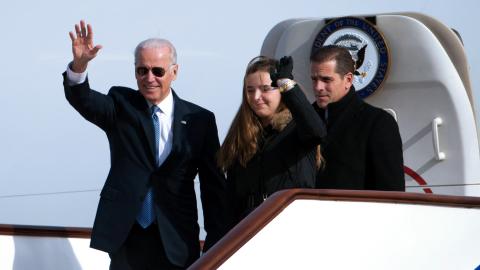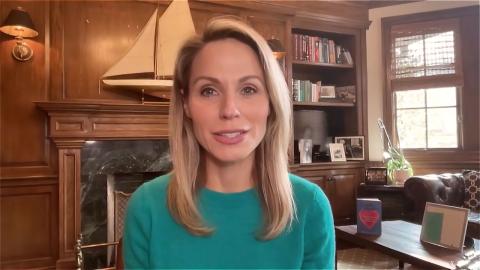
'Biden Lied': NYT Suddenly Discovers Hunter Biden Laptop Story Is TRUE After Media and Big Tech Tried to Crush It
The New York Times is finally admitting the New York Post's story about Hunter Biden's laptop was true – a year and a half after the election. The Times' admission reveals how the so-called mainstream media and Big Tech tried to bury a significant story during the 2020 presidential election by mislabeling it as "unsubstantiated" and "Russian disinformation."
And the Burisma energy company connection in the story seems more relevant than ever now that Joe Biden is in the White House and Russia has invaded Ukraine.
"People familiar with the investigation said prosecutors had examined emails between Mr. Biden, Mr. Archer, and others about Burisma and other foreign business activity," The Times reported on March 16. "Those emails were obtained by The New York Times from a cache of files that appears to have come from a laptop abandoned by Mr. Biden in a Delaware repair shop. The email and others in the cache were authenticated by people familiar with them and with the investigation."
***Please sign up for CBN Newsletters and download the CBN News app to ensure you keep receiving the latest news from a distinctly Christian perspective.***
As CBN News reported in October of 2020, The Post produced emails showing Joe Biden's son Hunter appears to have introduced the then Vice-President Biden to a Ukrainian energy executive.
An April 2015 email reads in part, "Dear Hunter, thank you for inviting me to DC and giving me an opportunity to meet your father and spen(d) some time together."
President Biden has claimed he knew nothing about his son's business dealings. But as multiple news outlets reported in October 2020, a former business associate of Hunter Biden said the claim made by then-presidential candidate Biden was false.
Barr: Biden Lied About Son's Laptop During Presidential Debate
Former U.S. Attorney General Bill Barr told Fox News on Monday that he was "shocked" to hear then-candidate Joe Biden lie about his son's laptop during the 2020 presidential debate against then-President Donald Trump.
"I was very disturbed during the debate when candidate Biden lied to the American people about the laptop," he said.
"He's squarely confronted with the laptop, and he suggested that it was Russian disinformation and pointed to the letter written by some intelligence people that was baseless — which he knew was a lie," Barr told Fox. "And I was shocked by that."
Post's Editorial Board: 'The Bidens Didn't Even Deny It Was True! They Just Deflected with the Media's Help'
A day after The Times' admission, The Post's editorial board took a shot at their coverage and the national press as a whole.
"In the heat of the presidential race of 2020, the Times never missed a chance to cast doubt on the laptop, saying the information was 'purported' and quoting a letter from former Democratic officials who claimed — with no evidence — that it was Russian disinformation. As recently as September 2021, the Times called the laptop 'unsubstantiated' in a news story," the board wrote in an op-ed published March 17.
"Why was it unsubstantiated? Because of willful ignorance and the Times' curious lack of curiosity. Hunter's business partner Tony Bobulinski came forward immediately after The Post's reports and confirmed that the emails bearing his name were legitimate," the op-ed continued. "The Bidens didn't even deny it was true! They just deflected, with the media's help, saying it was a dirty trick or not a story. Mostly, the press just ignored it."
Big Tech Squelched The Post's Story Right Before the Election
And the press had help from Big Tech in trying to suppress the story.
When New York Post editor Sohrab Ahamri tried to post the story on Twitter, his tweet was blocked. He called it "... a Big Tech information coup. This is digital civil war."
This is a Big Tech information coup. This is digital civil war.
— Sohrab Ahmari (@SohrabAhmari) October 14, 2020
I, an editor at The New York Post, one of the nation's largest papers by circulation, can't post one of our own stories that details corruption by a major-party presidential candidate, Biden. pic.twitter.com/BKNQmAG19H
Then-White House Press Secretary Kayleigh McEnany claimed Twitter locked her account until she deleted a tweet about the New York Post's Hunter Biden report.
She told Fox News, "They essentially have me at gunpoint and said unless you delete a news story by the New York Post I cannot regain access to my account."
Social media giant Facebook also suppressed the story by limiting its distribution.
Twitter's then-CEO Jack Dorsey eventually admitted Twitter's handling of this significant story at the height of the election "was not great."
Writing in The Wall Street Journal on Tuesday, Opinion Columnist Holman W. Jenkins, Jr. commented about why he thought The New York Times "has chosen this moment to rectify its own record on the Hunter Biden laptop."
"Critics understandably chortle but the paper perhaps is resurrecting itself for a serious moment. No 'news' triggered its surprise acknowledgment of the laptop's existence; it's revisiting of the younger Mr. Biden's seamy history was not driven by events. Instead, the need was for the Times to redeem itself from its participation in 2020's craven spectacle, when top-drawer news organizations suppressed the news and even tried to convince readers that something wasn't true that they knew was true," Jenkins, Jr. wrote.
In a recent commentary, Katrina Trinko, the editor-in-chief of The Daily Signal, also noted how the media and Big Tech worked together to crush the story.
"After all, if you can recall back to ye olde days of October 2020, believing the New York Post's report about Hunter Biden's laptop made you akin to someone who doubted the moon landing had ever happened," Trinko wrote.
"Indeed, it was considered such a dangerous lie that Big Tech rushed to squelch any chance of Americans hearing about the story," she continued.
"Twitter wouldn't let users tweet out the link to the Post's story—offering no explanation at first, and then arguing that the reporting could include private information and/or information obtained through hacking," Trinko said.




